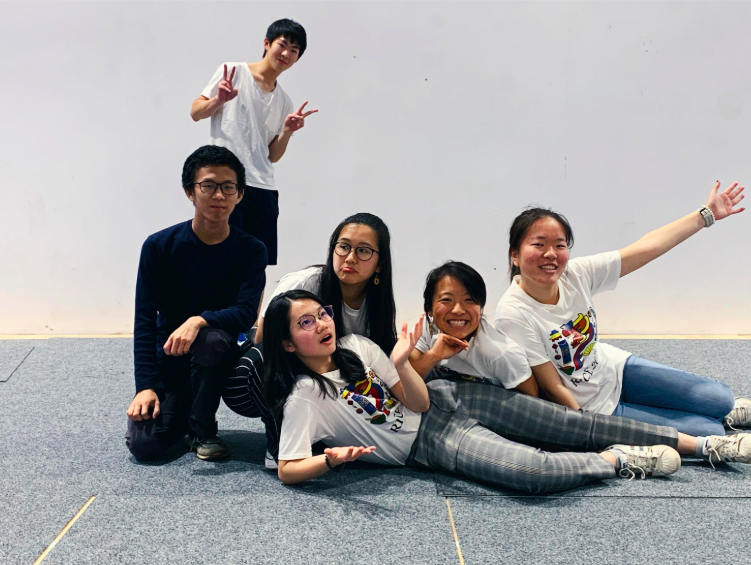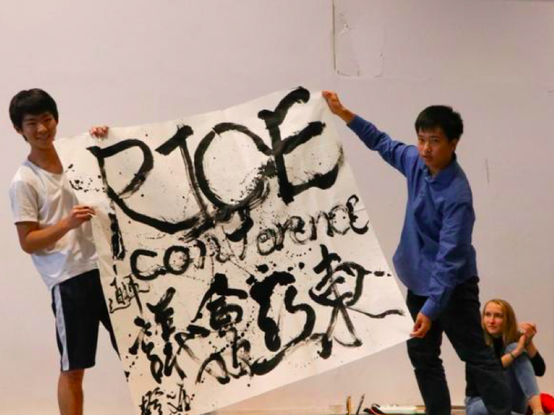Johanne Braarud, Grade 12
UWC Atlantic
Tivona Yeung is one of the main organisers of the RICE Conference at UWC Atlantic, which is a celebration of East Asian culture.
Q: What were your main goals in organizing the RICE conference?
A: To introduce different aspects of East Asian cultures and societies to AC (Atlantic College) students. On the one hand, we wanted to provide authentic experiences of East Asian cultures. That’s why we organized food workshops and cultural workshops such as “Mongolian calligraphy”, “Judo” and “Traditional Korean folk games”. On the other hand, we wanted to use RICE as a platform to discuss more serious issues from the region, which we did through workshops on topics such as the Tibet-China conflict and the Korea-Japan trade war.
Q: Do you think you have achieved these goals?
A: Of course, each student attended different workshops and activities and experienced the conference differently, but overall, I think we managed to give everyone an all-rounded experience of East Asian cultures and societies.
Q: How much time did you spend organizing the conference?
A: Way too much. A LOT OF TIME. Let’s just say I sacrificed a lot of deadlines.
Q: Was it still worth it though?
A: YES, so worth it.
Q: What were your favourite moments during the conference?
A: I really had a “WOW-moment” during the morning interactive session on Saturday. All the students filled the Sportshall and did Chinese broadcast gymnastics, and I felt a lot of relief and satisfaction in seeing so many students getting engaged and having fun with the activities we had provided. And also, a bunch of international students trying to do Chinese broadcast gymnastics is not really something you get to see every day.
Q: What are you most proud of achieving through the conference?
A: Pulling off this ambitious programme that we set out for the conference weekend, and not disappointing people’s expectations.
Q: How did you deal with controversial topics in the conference?
A: For the workshops about controversial topics we had students from both sides of the issue leading the workshops. We were quite concerned about raising controversial issues, but by preparing ahead, I think we managed to avoid any major conflicts. I think both the organizers and those who attended the conference learnt that we can discuss these topics meaningfully without fighting.
Q: What impact do you think RICE had on the college?
A: I think it has given an introduction to a lot of topics and issues that people may not have known about before, such as in workshops about the Chinese education system, the Japanese defence force and gender inequality in China. I also believe that the conference encouraged a continuation of discussions about these topics, so that the students’ learning about East Asia doesn’t stop after RICE.
Q: How do you think the conference affected the East Asian students at AC?
A: Clearly, it made us more united as a group, but I also think it gave a lot of people a chance to break out of their shell, and demonstrate their culture, as RICE gave them a platform to interact with all the different students at the college, which they may not necessarily have had to do before.
Q: How do you think the conference affected AC students’ view on East Asians?
A: I think RICE diversified the views on the East Asian students at the college as a group of different talents and cultures, who are a little more than people who just sit inside and study.
Q: What were your main goals in organizing the RICE conference?
A: To introduce different aspects of East Asian cultures and societies to AC (Atlantic College) students. On the one hand, we wanted to provide authentic experiences of East Asian cultures. That’s why we organized food workshops and cultural workshops such as “Mongolian calligraphy”, “Judo” and “Traditional Korean folk games”. On the other hand, we wanted to use RICE as a platform to discuss more serious issues from the region, which we did through workshops on topics such as the Tibet-China conflict and the Korea-Japan trade war.
Q: Do you think you have achieved these goals?
A: Of course, each student attended different workshops and activities and experienced the conference differently, but overall, I think we managed to give everyone an all-rounded experience of East Asian cultures and societies.
Q: How much time did you spend organizing the conference?
A: Way too much. A LOT OF TIME. Let’s just say I sacrificed a lot of deadlines.
Q: Was it still worth it though?
A: YES, so worth it.
Q: What were your favourite moments during the conference?
A: I really had a “WOW-moment” during the morning interactive session on Saturday. All the students filled the Sportshall and did Chinese broadcast gymnastics, and I felt a lot of relief and satisfaction in seeing so many students getting engaged and having fun with the activities we had provided. And also, a bunch of international students trying to do Chinese broadcast gymnastics is not really something you get to see every day.
Q: What are you most proud of achieving through the conference?
A: Pulling off this ambitious programme that we set out for the conference weekend, and not disappointing people’s expectations.
Q: How did you deal with controversial topics in the conference?
A: For the workshops about controversial topics we had students from both sides of the issue leading the workshops. We were quite concerned about raising controversial issues, but by preparing ahead, I think we managed to avoid any major conflicts. I think both the organizers and those who attended the conference learnt that we can discuss these topics meaningfully without fighting.
Q: What impact do you think RICE had on the college?
A: I think it has given an introduction to a lot of topics and issues that people may not have known about before, such as in workshops about the Chinese education system, the Japanese defence force and gender inequality in China. I also believe that the conference encouraged a continuation of discussions about these topics, so that the students’ learning about East Asia doesn’t stop after RICE.
Q: How do you think the conference affected the East Asian students at AC?
A: Clearly, it made us more united as a group, but I also think it gave a lot of people a chance to break out of their shell, and demonstrate their culture, as RICE gave them a platform to interact with all the different students at the college, which they may not necessarily have had to do before.
Q: How do you think the conference affected AC students’ view on East Asians?
A: I think RICE diversified the views on the East Asian students at the college as a group of different talents and cultures, who are a little more than people who just sit inside and study.
www.unitedworldwide.co


